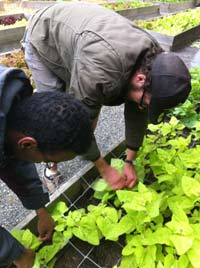Photo and text by Kathleen Bauer
Tim Donovan, who calls himself “a farmer and maker,” leads the agriculture team at Project Grow, a program of Port City Development Center, an arts and farming organization that works with adults with disabilities. The project brings together people active in the arts, farming and community organizing and has grown from one small plot of about an eighth of an acre to four plots covering more than an acre and a half.
With a background in science and organic farming, Donovan believes that what we call urban agriculture is actually urban horticulture, that is, it’s closer to gardening than actual farming. True farming requires having enough land under cultivation, he said, “to have enough time to let the soil replenish itself—putting things in rotation, letting stuff go fallow for several years and being able to provide the fertilizer resources within the city.”
Until that point is reached, though, he points out that there are many benefits to developing agricultural resources within cities:
- It provides a connection between eaters and where their food is grown or raised
- It’s a low cost way to use unused land
- It provides “genetic diversity” in food sources
With an original mission to provide employment and fair wages for developmentally disabled adults, the program dislikes the term “clients,” instead referring to its workers as “farmers.” Donovan sees the program as a laboratory for small-scale urban agriculture as well as a way to provide respectful employment for the developmentally disabled, rather than the typical sheltered workshop where they’re given repetitive tasks to perform.
At Project Grow the farmers harvest seeds, save them, plant and nurture them as they grow, harvest the produce, pack it for sale and participate in deliveries. This provides a context for development of skills and awareness rather than just participating in a tiny part of a process.
With a growing CSA (Community Supported Agriculture) and customers including neighborhood restaurants and markets, Donovan makes it clear that the produce that comes from the project’s gardens is, first of all, top quality. He wants to get away from the expectations of lower quality and rigor that is endemic to urban agriculture.
“Customers buy from Project Grow not because it’s a charity but because it’s good food,” he said.
Kathleen Bauer is a freelance writer in Portland, Oregon, focusing on agriculture and field-to-plate issues. Her blog, Good Stuff NW, is about her journey to connect the dots between what happening in the field and what she’s putting on her table, including stories about people who are making a difference in our local food system, about eating sustainably and locally, and about the political issues affecting the food we find at our markets and stores.
Most of the videos featured on Cooking Up a Story were produced, filmed, and edited by Rebecca Gerendasy. Fred Gerendasy contributed as a writer to many of the posts and occasionally as the interviewer. Visit Rebecca Gerendasy Clay – Art and Fred Gerendasy Photography to see their current work.

